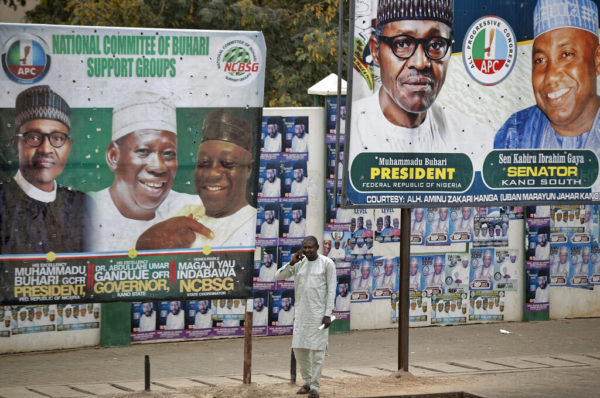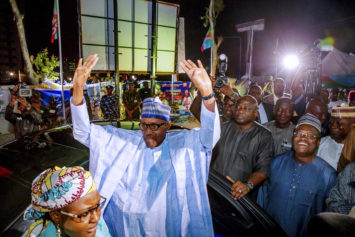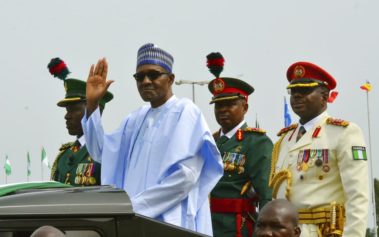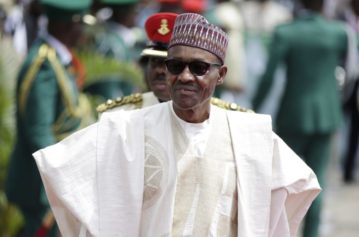KANO, Nigeria (AP) — A spokesman for Nigerian President Muhammadu Buhari’s campaign asserted Tuesday they have unofficial numbers showing he has won a second term in Africa’s largest democracy.
Babatunde Fashola, campaign director for election monitoring and Cabinet minister for power and works, told The Associated Press in an interview that they were preparing “for the president to give his acceptance speech” and celebrate Tuesday night. Dozens of supporters began dancing outside party headquarters.
Top opposition challenger Atiku Abubakar should accept his loss gracefully and concede, Fashola said: “Let this nation move forward.” Abubakar also should provide evidence to back up claims that the ruling party manipulated results of Saturday’s vote, which Buhari’s party rejects, Fashola said.

A man takes a call on his cellphone as he stands between two billboards showing Nigeria’s President Muhammadu Buhari and other party officials, in Kano, northern Nigeria Tuesday, Feb. 26, 2019. Buhari’s election lead grew on Tuesday during a second day of announcing state-by-state election results in Africa’s largest democracy. (AP Photo/Ben Curtis)
As the official state-by-state announcements of election results passed the halfway mark on Tuesday evening, Buhari led by more than 1.5 million votes. He had won 13 of Nigeria’s 36 states including its most populous one, Lagos.
“I congratulate you very much that you have succeeded,” the president said while visiting campaign workers on Monday night. His first term was hurt by a rare recession and widespread insecurity.
Also Tuesday, the death toll in election-related violence rose to 53 as an extremist attack was found to be worse than first reported.
Abubakar, a billionaire former vice president, won 11 states, most in the largely Christian south, and the capital’s territory. His party was largely quiet on Tuesday, and Abubakar has not made a public appearance since voting.
The announcement process could continue into Wednesday in a race once described as too close to call.
Election observers say the vote, a step back from the widely praised one in 2015, suffered from a surprise weeklong postponement and significant delays in the opening of polling stations. While they called the process generally peaceful, at least 53 people were killed, analysis unit SBM Intelligence said.
The toll rose because an attack claimed by the Islamic State West Africa Province extremist group in the northeast was deadlier than first thought, with at least 17 people killed, head of research Cheta Nwanze told the AP.
Nigerians now wonder whether Buhari and Abubakar will follow through on pledges to accept a loss, or challenge the results. A former United States ambassador to Nigeria, John Campbell, says the troubled election has given them grounds to go to the courts. That route could take months.
In Kano, Nigeria’s second-largest state and the heart of the country’s Muslim north, the local results were declared at 4 a.m., with Buhari winning.
“Well, we thank God that at least we finished this safely, without any hitches,” the state electoral commissioner, Riskuwa Shehu, told the AP.
Turnout appeared to be lower, Shehu said. He pointed to a number of factors, including the fear of possible violence after heated campaigning. The “disappointment” of a weeklong postponement likely played a role, he said.
Nigerians’ reactions to the election results were mixed.
“Alhamdulillah,” said 36-year-old Umar Ibrahim, who bantered with clients about politics at his tiny shop in Kano. “Up to now they say Buhari is leading, far. He is a good elder.”
Grace Eje, a 25-year-old domestic worker, held out hope for Abubakar, saying Nigeria needed someone new after Buhari. “No money, no work, no help from him,” she said of the president, grimacing.
Nigeria’s some 190 million people say they pray for peace. They were surprised in 2015 when President Goodluck Jonathan conceded before official results were announced giving victory to Buhari, a former military dictator who pulled off the first defeat of an incumbent by the opposition in the country’s history.
Many worry that such a concession appears unlikely this time.
“Jonathan set the benchmark on how electoral outcomes should be handled,” Chris Kwaja, a senior adviser to the United States Institute of Peace, told the AP. “Accept defeat in the spirit of sportsmanship. This is a critical vehicle for democratic consolidation. So far, it is unclear what the candidates will do.”
For the presidency, a candidate must win a majority of overall votes as well as at least 25 percent of the vote in two-thirds of Nigeria’s 36 states. If that isn’t achieved, the election moves to a runoff.
The YIAGA Africa project, which deployed more than 3,900 observers, projected that no runoff election will be needed and that a “clear winner” would emerge.
It was not yet clear how many of Nigeria’s estimated 73 million eligible voters turned out. YIAGA estimated turnout at between 36 percent and 40 percent, down from 44 percent in 2015. That would continue the trend of recent elections.


